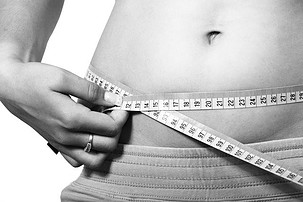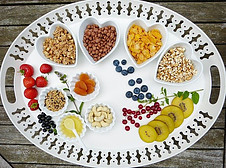With another Christmas now behind us, the new year is when a lot of us are looking to lose that extra holiday weight we’ve gained. I’ve definitely had one too many mince pies, vegan ones obviously! One thing that could help fat loss is intermittent fasting. But what is intermittent fasting for fat loss? That’s what today’s article is all about, I’ll also be looking at the benefits of intermittent fasting as well as the different ways you can intermittently fast. By the end of the article you should have all the information you need to know what is intermittent fasting for fat loss and more importantly whether it’s for you.
What is intermittent fasting
Intermittent fasting is a prolonged period of not consuming any calories. So not eating any food and not drinking any drinks apart from water, tea and coffee. Depending on how strict you’re being sometimes not even tea or coffee is allowed.
Did you know…
..we all take part in intermittent fasting without even knowing it when we’re sleeping. We fast from when we last ate before going to bed to when we eat the next day, usually breakfast. So we all naturally fast for around 10-14 hours anyway. Intermittent fasting can be just an extension of this.
Popular intermittent fasts
One of the most popular intermittent fasts and the one I do is the 16/8 fast. I stop eating at 8pm every night then I don’t eat again until after midday the next day. This is a 16-hour fast with an 8-hour window where I do eat, hence the name 16/8. Another popular one is the 5/2 diet where 2 days a week you eat only 500-800 calories a day and the other 5 days you eat as normal, within reason (not drinking a bottle of wine every night for the other 5 days!).
Everyone’s different
Different fasts will work for different people. I don’t feel particularly hungry in the mornings anyway so for me skipping breakfast works. If you’re starving in the mornings fasting at a different time could work better, start eating at 8am and stop eating by 4pm, this would be a 16-hour fast. I’m always hungry in the evenings so this one definitely wouldn’t work for me.
Benefits of intermittent fasting
There are many benefits to intermittent fasting, weight loss being one of them however there are also health benefits as well.
Intermittent fasting for fat loss
When you intermittently fast you do naturally eat less which can help with weight and fat loss. But it does depend on what you eat whilst you’re not fasting. For example the fast that I do where I don’t eat until after midday, if I eat a (vegan) burger and fries for lunch followed by a chocolate bar and a packet of crisps I’m probably not going to lose weight and fat. If I just eat what I usually would for lunch, some soup or falafels with houmous for example there’s a good chance I would lose weight. Exercise can also help with fat loss, these articles are a good read:
Walking workouts to lose weight
How to lose belly fat with weights
Tracking your calories could help you lose weight as well, you wouldn’t need to track for the whole time you’re trying to lose weight, once you’ve done it for a couple of weeks you’ll know roughly what you’re eating so can make changes if needed. Include a couple of weekends in your tracking as most of us don’t eat so healthy at the weekends. I’m definitely guilty of this! I use my Fitbit app to track my food, you can also use apps like my fitness pal.
You also need to know your maintenance calories if you’re going to track your calories, I go through this in more detail in this article – Can I lose weight on a plant based diet?
Intermittent fasting can change your body making it more susceptible to fat loss
Yes you heard that right! Intermittent fasting can actually change our bodies making us primed for weight and fat loss. But how does it do this?
- Insulin levels drop which makes stored body fat more accessible
- The levels of human growth hormone increase, this aids fat loss and helps to build lean muscle mass
- Increased release of the fat burning hormone norepinephrine
So it’s not just about the reduced calorie intake, intermittent fasting can also change the way our bodies work making it easier for that weight and fat to come off. Now that is impressive!
Other benefits of intermittent fasting
As well as fat loss there are other benefits of intermittent fasting.
- Cell repair – When in a fasted state cells start to repair themselves. Autophagy takes place which is where cells remove old proteins that have built up.
- Lowers blood sugar – Which protects from developing type 2 diabetes.
- Can reduce LDL cholesterol – This is the bad cholesterol that builds up in your arteries
- Can prevent cancer – These tests were conducted on animals which of course I don’t condone.
- May protect against Alzheimer’s disease – More tests on animals 🙁 . Human testing on this is definitely needed.
- It’s easy to do – Just don’t eat!
- Doesn’t require any special equipment
Different ways to intermittently fast

There are a number of different fasts that can be done. They range from fasts that you do every day where you eat within a certain window through to fasts where you don’t eat for a longer amount of time, 24 hours for example. The main fasts are:
16/8
With this fast you eat during an 8-hour window and fast for 16 hours. You do this 7 days a week or most days at least. A few examples are eating between 8am and 4pm, 10am and 6pm or 12pm to 8pm. The 12-8 fast is the one I do because I find it easier to skip breakfast, but everyone’s different. Find the one that works for you. The reason this fast is so popular is that is takes advantage of when we’re sleeping so most of the time that you’d be fasting you’re asleep anyway.
18/6 and 20/4
These are similar to the fast above but you have a shorter eating window. The 18/6 you eat within a 6-hour window which could be 2pm to 8pm. The 20/4 you eat in a 4-hour window, for example 12pm to 4pm.
The 5/2 fast
This intermittent fast is different to the ones mentioned above as it involves only fasting for 2 days of the week. The other 5 days you eat as normal, but not over indulging. On the 2 days that you fast you consume around 500 – 800 calories, depending on how strict you want to be. The two days you fast on should not be consecutive. For example a Monday and Thursday but not Monday and Tuesday.
Longer intermittent fasts
Longer fasts can be done in a few different ways, the one mentioned above is just an example. You could also do a 24-hour fast 3 times a week so every other day. Or amend this slightly where you eat very few calories every other day. This fast is more of an extension of the 5/2 fast. A 36-hour fast is also another option, this would only be done once a week and you should definitely consult your doctor before doing this.
Any reasons I shouldn’t intermittently fast?
Fasts are not recommended for any of the below:
- If you’re pregnant or breastfeeding
- You have or have had an eating disorder
- Anyone under the age of 18
- If you’re underweight or struggling to gain weight
Will you be using intermittent fasting for fat loss?
Intermittent fasting can help you lose weight and body fat but it isn’t for everyone. You will feel hungry when fasting and probably a bit cranky as well, just don’t take it out on everyone! It worked for me last year and I may do it again this year (the 16/8 fast) to help me lose the weight I’ve gained over the Christmas holidays. If you’re not sure if it’s for you do lots of research and talk to your doctor. If you do decide to try it it will be harder at first but your body does get used to its new eating schedule and it does get easier. Just don’t overeat when you are in your eating window.
Why not try a vegan diet whilst intermittently fasting? If you’re not sure where to start with going vegan have a read of this article. And if you need a reason to go vegan read this.
What do you think about intermittent fasting? Is it for you? Have you tried it already? I’d love to know your thoughts, just comment below.
Until next time
Katie








Luke Moretti
Hello, I have heard a lot about this INTERMITTENT FASTING type of diet. I am intrigued, There are so many types of diets/fitness programs, supplements etc and I am glad you bought up the fact that everyone is different and what may work for some may not work for others.
Cheers for the read
Katie
Hi Luke
Glad you found the article useful.
Katie